My friend Steve Mate once told me that it was bound to happen, and he was right. I was guiding on the Henry's Fork, floating two gentleman from Texas down the Box Canyon, when the fellow in the bow turned toward me. He motioned around with his fly rod, taking in the beauty of it all—the high, lichen-tinged cliffs, the huge evergreens leaning out over the water, the blue sky, the wild flowers scattered on the banks, the osprey soaring overhead and, of course, the river itself bounding down the canyon—and he asked me, in that self-satisfied tone most folks associate with the extremely well-to-do, "I wonder what the poor people are doing today?"
"I can't speak for anybody else," I told him, "but I'm rowing the boat."
Guiding for trout used to be a relatively simple business. "I'll show you where the fish are," your guide would say, "maybe even tell you what fly they'll take, but it's up to you to catch them." It was an unspoken rule that the guide was just that - a guide. It was the angler's responsibility to handle his end of things.
Times have changed, though, and guiding has become a touch more complicated. Nowadays, in addition to locating fish, most guides act as angling and casting instructors, entomologists, naturalists, historians, waiters, comics, and even marriage counselors. In short, your average trout guide is now responsible for picking up his or her clients in the morning and, be they expert anglers or rank beginners, making sure they have an enjoyable day on the water.
Sometimes this even involves catching a few fish.
While I've thought about it a fair amount, I can't say for certain whether this particular change is for the better or the worse. As with most aspects of modern life, it's possible to see both the advantages and the problems with the "new" way of doing things. There is one issue, though, that worries me.
Fly fishing, or at least fly fishing the way I like to perceive it, isn't about quick fixes or shortcuts. As an angler, you need to take your time, pay your dues and savor the process of learning the sport. When people - whether they're guides, writers or just well intentioned friends - try to make things too easy, they're actually stealing the enjoyment of figuring things out for yourself.
Now don't get me wrong. I'm not saying that we should ignore information that helps us become better, more ethical, fishers. We shouldn't. It's just that when a guide says, "I can teach you more about fishing in one day than you can learn on your own in a year," you ought to ask yourself if that's really what you want. If fly fishing were easy it wouldn't be nearly as much fun, and that's something to keep in mind the next time you're tempted to accelerate the learning curve.
Back when I first contemplated guiding, I fell into the same trap as every other guide-to-be. I thought to myself, "Hell, I love to fish, I love to hang out with other anglers, and I love to work outdoors. I should become a fly fishing guide." The second and third points are pretty reasonable. The first, though, is an excellent argument for staying out of the business altogether.
Here's the deal. Guides don't fish unless it's their day off. If you're a competent guide, chances are you won't have many of those. Consequently, you won't fish much.
Instead, you'll stand around looking "sage" and "guru-like" while your clients tangle their lines, pound the water, and put down the majority of rising fish in your general vicinity. If you love the sport as much as I do, that's not always a wonderful trade off.
If I make my former profession sound frustrating ... well, it can be. Even an established guide can't rest on his or her laurels, and you're constantly dealing with the fickle idiosyncrasies of the fly fishing public. And believe it or not, while fly fishermen tend to be wonderful people on an individual basis, as a group we're stranger than most.
For example, we tend to fixate on weird things—waterproof pants, genetically engineered chicken feathers, even the archaic Latin names of aquatic insects—and we think nothing of standing in the water for hours, through all kinds of nasty weather, trying to tempt our quarry into eating something it shouldn't. Then, on those occasions when we're actually successful, we turn around and let the little buggers go.
You might as well face it. Despite our protestations to the contrary, we're not poster children for normal behavior.
Years ago, my friend Jay Reynolds and I used to load my pickup and drive west for our annual fishing trip. We'd camp wherever we fished, sometimes on famous rivers like the Madison or the Snake, sometimes on little creeks that we'd never heard of, and the whole process—driving out, fishing, driving back—would take about a month.
Sleeping in a tent can get old, though, so one year we decided to try something a little different. We booked a one week stay with a Montana outfitter, based on his promise of a fancy lodge, good food, 5 pound rainbows and 18" brookies. It was expensive—a couple thousand each—but no more so than taking a month off work, and we figured that if we were going to spend our money anyway, it might as well be on something we enjoyed.
Also, and perhaps just as importantly, Jay and I both believed that fishing you paid for simply had to be better than fishing you didn't.
We flew out from New York on the first Saturday of August and the outfitter, a lean fellow with a droopy mustache, picked us up and drove us out to his lodge. After we unpacked, we walked outside to meet our guide, the fellow who was responsible for producing all those 5 pound rainbows and 18" brookies.
He was waiting in the driveway, a slight, blonde haired fellow of medium height. His face was Irish-handsome, though weathered from the sun and wind, and he had impressive eyebrows, the kind that gather like storm clouds over the horizon. He shook our hands and told us that his name was Tim Linehan.
"Linehan. Linehan. Sounds like Lend-a-hand." I thought. "I can remember that."
After talking about the weather and the baseball season - Tim was a Red Sox fan, Jay and I rooted for the Mets—the three of us walked down to the river, where I asked Tim about the fishing.
"Will our arms get tired from hauling in big brookies?"
He seemed to think that was pretty unlikely.
"What about five pound rainbows?"
Not much chance of that, either.
"OK, what should we expect?"
Tim smiled and said, "You're going to have a great time. Just relax and leave everything to me."
And he was right. Despite the fact that the largest fish of the trip turned out to be a sixteen inch rainbow, we really enjoyed ourselves. Tim met us for breakfast every morning, and then depending on our mood, we'd either wade the little river or float the big one. We caught a ton of trout, and the fact that they were little guys didn't detract one smidge from the whole experience.
So now, more years later than I care to admit, I can give credit where credit is due, and thank Tim Linehan for showing me that having fun and catching big fish are not always joined at the hip.
Now that my guiding days are behind me, it's a little easier to look at my former profession with some degree of impartiality. You may not agree, but I believe that if you're going to book a guide trip, you should—at a bare minimum—learn how to cast before you show up on the river. Likewise, you should put yourself in the proper frame of mind, which translates into “have some fun, catch a few fish, and learn a little bit more about the sport.”
Your guide will be responsible for handling all one hundred and fourteen details that go into making a good trip possible. He or she should know the water, the fish, the bugs, and above all, how to relate to people regardless of whether they're beginners, experts, or somewhere in between. To be blunt, a guide who doesn't like his clients is about as useful as teats on a bull. Which is why the best guides enjoy their anglers every bit as much as they enjoy fishing themselves.
So before you take that next fly fishing vacation, ask yourself if you really do need a guide. And if your answer is yes, and if you subsequently end up having one of those incredible days, the kind where the sun shines, the fish bite with gusto and the mosquitoes don't carry you off, remember that there's always one ill-advised question that you just never, ever want to ask.
Because it's always the poor guy rowing the boat.






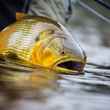

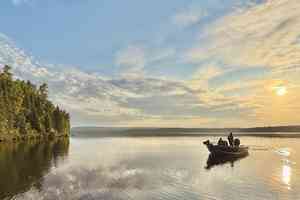


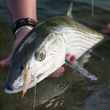
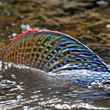
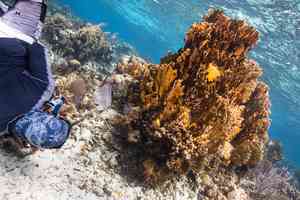


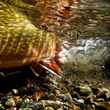



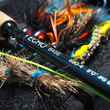





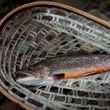
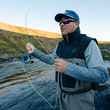
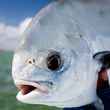

Comments